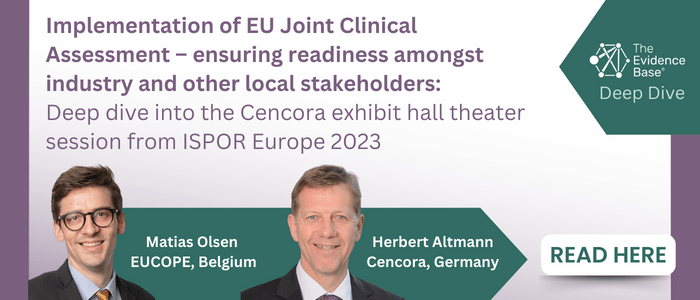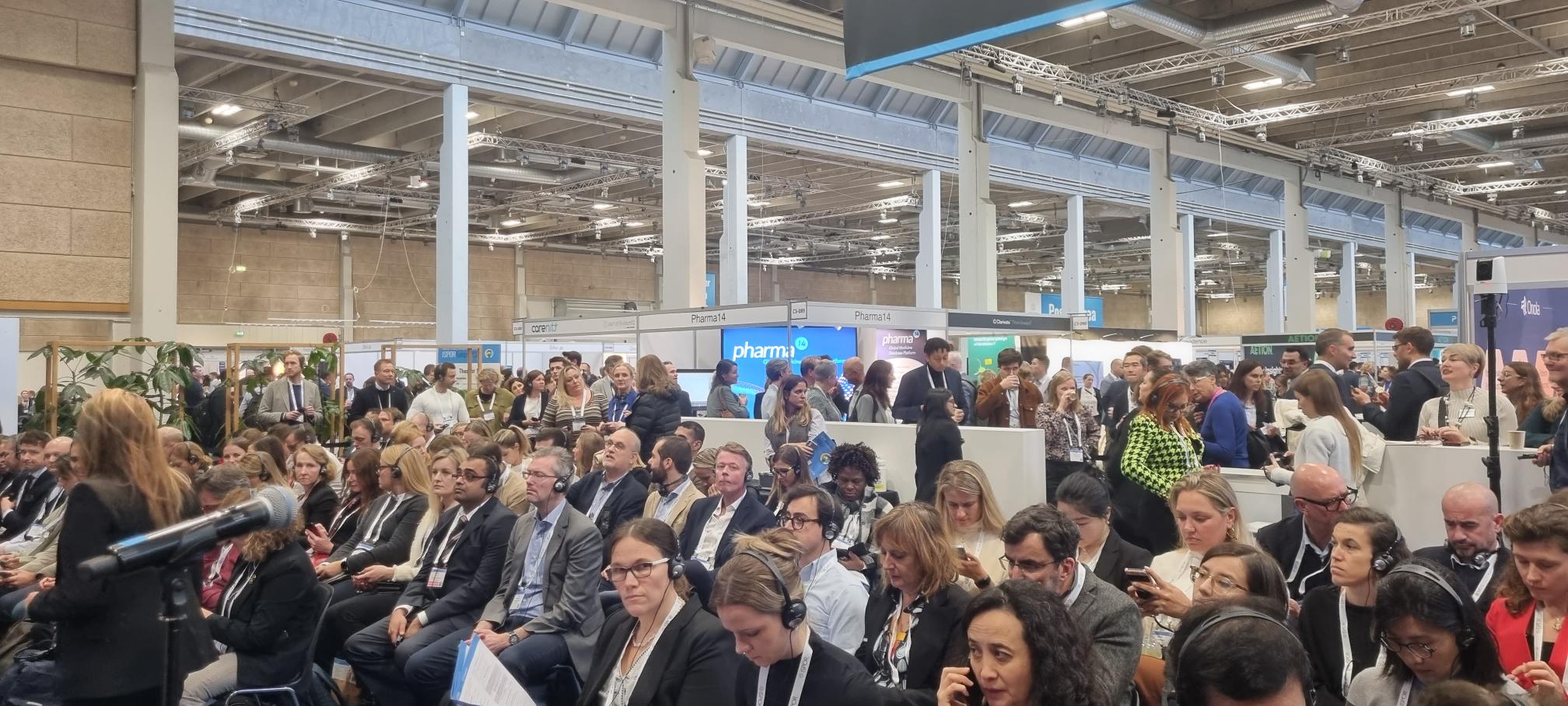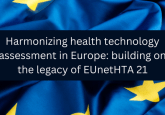Implementation of EU Joint Clinical Assessment – ensuring readiness amongst industry and other local stakeholders: Deep dive into the Cencora exhibit hall theater session from ISPOR Europe 2023

At ISPOR Europe 2023 (November 12–15, 2023; Copenhagen, Denmark), Cencora sponsored a session entitled ‘How to Prepare for JCA in Local Health Systems? Ensuring HTA, Payer, and Industry Readiness to Accelerate Patient Access to Innovation.’ In this deep dive, we summarize some of the discussions from Herbert Altmann (Head of Market Access Commercialization, Cencora, Germany) and Matias Olsen (Senior Manager, Public Affairs & Policy, European Confederation of Pharmaceutical Entrepreneurs [EUCOPE], Belgium).
For background reading on joint clinical assessment (JCA) in Europe, you may be interested in our interview with Altman and other experts:
How ready is the industry to participate in the JCA process in an effective way to bring innovative medicines faster to more patients?
Herbert Altmann began the discussion by giving a brief overview of the current status of JCA in Europe, explaining that overcoming uncertainties by local countries as well as industry is key for implementation of JCA from January 2025. Olsen began by explaining that EUCOPE works with a range of small- and mid-size pharmaceutical companies so can see the challenges of JCA from these different perspectives. One of these challenges relates to the capacity of these companies to do one single assessment for all 27 member states. JCA requires the harmonized submission of clinical evidence instead of staggered submission to multiple national HTA bodies that has been the process up to now. If the evidence requirements are not harmonized, this risks increasing rather than decreasing the burden on companies.
The second challenge centers on the need for reorganization within companies. The JCA process more closely follows regulatory timeframes and will require companies to align functions, such as regulatory and market access teams, much earlier on. Although the detailed timelines for JCA have not yet been defined, Matias Olsen expects the European Commission to announce these in the beginning of 2024. Companies are having to make plans for JCA now, “whilst the rules are still being written.” Olsen commented that larger companies can better anticipate and prepare for these challenges, whilst for small companies, with in some cases only one or two people in the market access team responsible for launch of a product in Europe, it is a much more difficult situation.

Standing room only: Implementation of EU Joint Clinical Assessment
From Cencora’s experience working with larger companies, Altmann explained they also face their own challenges. Cross-functional teams at both the headquarter and national level need to increase efficiency and speed of collaboration to work together more effectively to produce the evidence packages needed. Clinical evidence on the safety and efficacy of a product is considered on the European level. However, in the future companies need to work with local health authorities earlier to ensure this evidence is relevant to their market as well. Pricing and reimbursement decisions will be made locally with individual HTA bodies, so companies also need to consider whether additional data is needed to confirm the value of the product. This all needs to be done in parallel, complexity may increase and there is a lot to consider to avoid a product not being available, or access being delayed due to the following pricing negotiation process.
Both Olsen and Altmann agreed that opportunities are available for organizations to support companies by providing resources and sharing up-to-date information on the most recent developments.
“EUCOPE and EFPIA are both organizations supporting companies to have a voice in the process, which is very important during this critical phase to achieve all the goals the new JCA or EU HTA regulation want to achieve, to reduce bureaucracy, to have equal access to patients in Europe and to accelerate the process.” Herbert Altmann, Cencora, Germany.
How can we ensure bureaucracy and workload are not duplicated by HTA bodies?
Olsen addressed this question from Altmann by reiterating the potential for JCA to speed up access to innovative therapies, reducing burdens for both companies and HTA bodes. By using the ‘one-stop-shop’ and setting up the JCA report for new interventions, the intention is for duplication across member states to be avoided; however, Olsen acknowledged that whilst there is an opportunity, there is also a risk that additional evidence will be requested in some countries.
“So how do we then mitigate this? I agree, we need to make sure that the JCA report is as relevant as possible for the Member States, and this comes down to ensuring the PICOs (patient population, intervention, comparison and outcomes) are relevant. But there is also a trade-off here, because if we are not able to then arrive at PICOs in scope for the assessment that are also manageable, then we cannot expect companies to be able to answer all of those questions in one go.” Matias Olsen, EUCOPE, Belgium.
Olsen noted that EUnetHTA 21 has recently trialed the member state PICO survey, which will enable each member state to put forward their requirements for the scope of the JCA. The number of PICOs put forward was quite high – between six and nine PICOs for each assessment, with several populations and sub-populations. A compromise is therefore needed to ensure that all relevant information for member states is included, whilst also making sure the JCA process is workable. If not, companies will very likely not be able to deliver and will have to prioritize some PICOs over others. This presents an opportunity to have more of a dialogue around the PICO that is most relevant, relying on information that companies already have, such as the standard comparators currently used across Europe.
“We can rely on some of that information to start shaping the PICO before we then gather the requested PICOs from member states to arrive at what is most important, most relevant for an EU assessment rather than just having an amalgamation of all the PICOs. Because if not, we are not really reducing burdens, we are just putting everything into one basket.” Matias Olsen, EUCOPE, Belgium.
Olsen suggested the way to achieve this is involving companies and other stakeholders as well as European treatment guidelines to identify the most relevant treatments to compare against.
Again, Altmann agreed, explaining that this will be a learning curve with the first assessments to determine how this might work and how healthcare system stakeholders can contribute in a meaningful way.
How are the small- to mid-sized companies ensuring the patient voice is heard in the JCA process?
Olsen explained that patients are now being involved in a meaningful, systematic way through mandatory inclusion within both the joint scientific consultation (JSC) and JCA processes. Some member states have previously included patients in HTA, but it has not always been transparent in terms of who or why they were involved. The European Commission has, for example, proposed that the HTA Stakeholder Network could propose experts, patients and clinicians for individual assessments. Olsen noted the challenges with involving experts in highly specialized areas such as rare disease when it comes to conflicts of interest, where you do not want to exclude the most knowledgeable experts, this will be addressed in the forthcoming implementing act on conflicts of interest expected at the beginning of next year.
Is the PICO scoping process transparent enough for companies?
Olsen acknowledged that more discussions and engagement is always welcome. Our member companies who have participated in EUnetHTA 21 joint actions highlighted the scoping meeting to be one of the most valuable interactions, enabling them to get a much better understanding of what the assessors actually wanted, particularly in terms of need to generate or provide additional evidence. Without the scoping meeting, Olsen explained, a particularly important point of interaction that can increase the quality of assessments is lost. The scoping meeting is not currently described in any of the early thinking around methodology procedures for JCA, despite being a part of EUnetHTA Joint Actions and national procedures, so Olsen called for these meetings to be included.
“We have heard that a scoping meeting is not needed because companies can simply go to each individual HTA body to have the same conversations, however if you are a much smaller company, it is not so simple since you do not have such a large market access team. We need to make sure that we are designing this procedure for a plethora companies, smaller or larger.” Matias Olsen, EUCOPE, Belgium.
Olsen also recognized that additional guidance on the selection of PICOs to be used in the assessment was also needed.
How can companies prepare for local healthcare system engagement for JCA?
Olsen suggested that companies need to monitor all the current processes that are happening over the coming weeks and months, and the best way to do so is via the trade associations involved in the implementation, such as EUCOPE. There are currently several implementing acts that need to be decided and will include some of the final details. The coordination group is also putting their final plans together for the applicable methodology and these details will be vital to ensure companies know how to prepare.
Are member states and HTA bodies ready for JCA to begin in January 2025?
After the session, Altmann and Olsen spoke exclusively to The Evidence Base, providing further reflections on the readiness for JCA by companies as well as member states and HTA bodies.
Olsen explained that healthcare systems and HTA bodies have been working voluntarily over the past decade through joint actions as well as in the 2 year EUnetHTA 21 service contract aimed at preparing common ways to operationalize JSC and JCA. However, these proposals need to be further discussed with the affected stakeholders before the operational procedures and methodologies can be finalized.
“There’s a lot of work that still needs to be done from each member state to come together to harmonize or find a common way of doing things. That is one of the challenges that they are facing.” Matias Olsen, EUCOPE, Belgium.
Altmann suggested this is a ‘learning curve,’ with adjustments and improvements in the process expected as JCA widens to include all products.
“Dialogue is very important between all the healthcare system stakeholders. That is, of course, on the one side, companies and HTA bodies, but it is also very important with clinicians and patient organizations. We have to ensure that the patient voice is still heard and is respected in this process.” Herbert Altmann, Cencora, Germany.
Altmann also stressed the potential burden on smaller companies through the additional workload needed to compare the JCA report with their own healthcare system requirements and different ways of working to achieve this. Health authorities of smaller countries will need to find ways to support each other.
How can jurisdictions outside the EU benefit from JCA?
Olsen noted that within the submission dossier template for JCA, HTA reports from other countries such as the US, Japan and Australia, might be required. Altmann observed that from a company perspective, they will also be able to present the outcome of the JCA process to other countries. Both Altmann and Olsen agreed countries will now be able to use the JCA reports in their decision-making, preventing duplication of work.
“In smaller countries, such as Romania and Hungary, where you have timelines of three to five years until an innovative product is reaching the patients, they could accelerate very nicely. They can take this report and include it in their assessment so it will shorten the HTA assessment timelines. Then it is only left to the price negotiation which could be another hurdle to overcome but at least this part is accelerated.” Herbert Altmann, Cencora, Germany
About the speakers
 Herbert Altmann, PhD, Head of Market Access Commercialization, with PharmaLex, a part of Cencora
Herbert Altmann, PhD, Head of Market Access Commercialization, with PharmaLex, a part of Cencora
Herbert Altmann leads the European Market Access department, working with pharmaceutical companies bringing innovative medicines to patients as fast as possible. Before joining PharmaLex in February 2023, Altmann worked at Novartis for more than 10 years, serving as the Head of Value & Access Region Europe. Altmann also was a NVS representative on the EFPIA HTA working group, participating in two Joint Action 3 pilot assessments.
 Matias Olsen Senior Manager, Public Affairs and Policy for the European Confederation of Pharmaceutical Entrepreneurs (EUCOPE)
Matias Olsen Senior Manager, Public Affairs and Policy for the European Confederation of Pharmaceutical Entrepreneurs (EUCOPE)
Matias Olsen supports EUCOPE on key topics, covering, among others, implementation of EU HTA, advanced diagnostics, real-world evidence, the Patent Package, Europe’s Beating Cancer Plan and relevant market access topics. Matias has previously advocated on behalf of European cancer patients and worked in the Norwegian Social Security Administration, with reimbursement of medical devices and coordination of social security within the EU/EEA.
![]()
Sponsorship for this Deep Dive was provided by Cencora.

 ‘
‘




